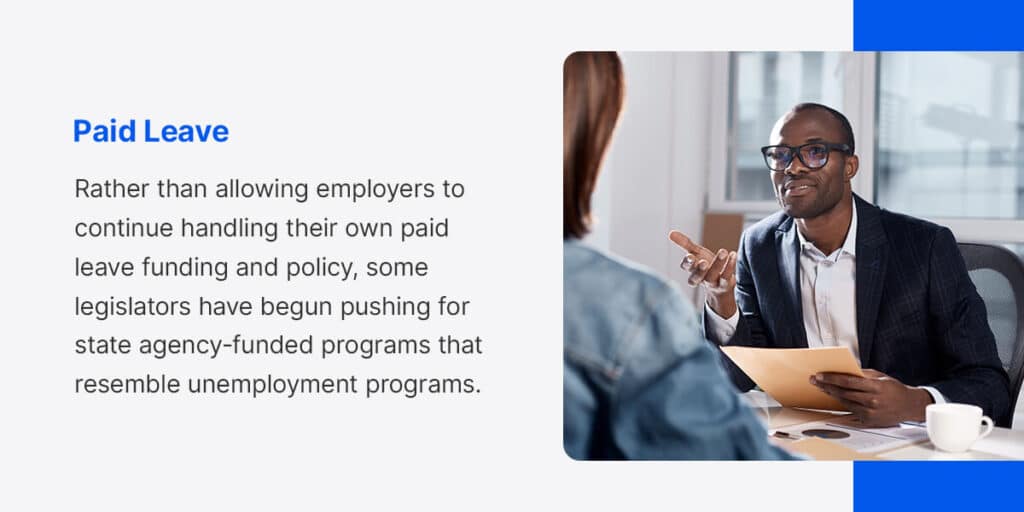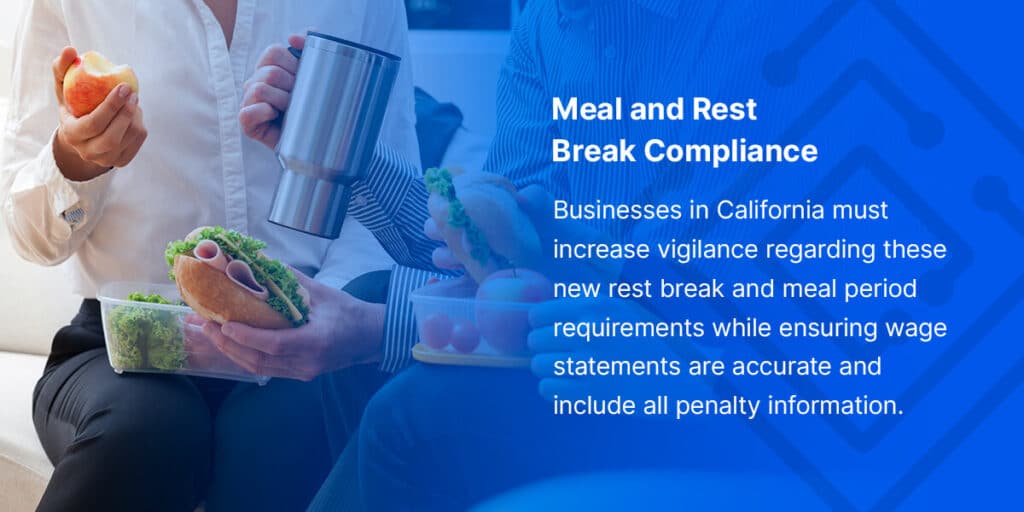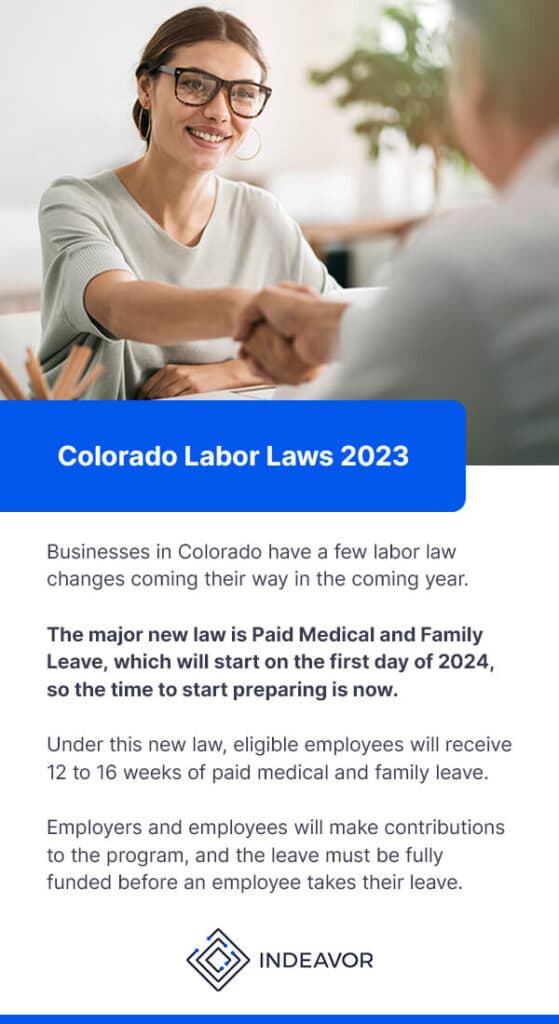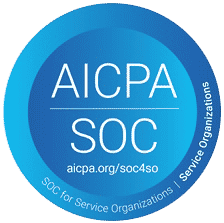2023 is well underway, and with it, there are new labor laws businesses should be practicing. As an employer, your goal should be to provide a great working environment for every employee. But, with so much to manage, how can you best cultivate a fair workplace where workers have the protection they need? We’re here to help simplify the process.
This article will discuss the new laws employers must know as we get deeper into 2023. You can always implement various new and exciting things to make your workplace great, but it will all be for nothing if you aren’t following the latest employment laws that present the bare minimum of what workers are entitled to.
Here are some of the new labor laws you need to know about for this year.
Key Federal Labor Laws 2023
First, the new laws you should know about for 2023 are those that affect businesses on a national level. Federal labor laws are relevant for all 50 states, providing the foundation for regulations that businesses across the country must follow. By understanding and following federal labor laws for 2023, you’ll be able to foster a compliant workplace that sets employees up for success.

Updates on Paid Leave Programs
Paid leave is a program that lets employees take time off work to handle qualifying personal matters while still making money during their absence. Rather than allowing employers to continue handling their own paid leave funding and policy, some legislators have begun pushing for state agency-funded programs that resemble unemployment programs. This would allow more employees to take extended time away from work while still getting paid during that period by simply applying to the state’s paid leave program.
In this system, employers would continue to make case-by-case determinations under the Family and Medical Leave Act, but the state would choose how much money an employee should receive during their paid leave. The state agency will also handle the payment process. Human resources departments would have to adjust by making sure they properly schedule their employees during periods of paid leave while giving employees who are taking paid leave proper access to government resources.
Although there is no form of paid leave offered on the federal level, some states have already begun implementing this type of paid leave system. These states include Massachusetts, Connecticut, and California, with several other states like Minnesota, Michigan, and Oregon nearing implementation as well. Know your state’s policies and continue paying attention to the United States Congress’s advances to make sure you’re giving your employees proper access to paid leave opportunities.
Anticipated Overtime Law Changes
Despite the fact that there have been no changes regarding overtime law on the national level, changes could be coming later in 2023. The Department of Labor stated that increasing employee eligibility for overtime is one of their top priorities despite continuing to extend the deadline for proposing a new salary threshold. The Department held listening sessions with stakeholders in 2022 to start coming up with a new overtime strategy, but by the end of the year, no official regulations were proposed. You should be ready in case the Department takes swift action in 2023 regarding overtime regulations.
An increased salary threshold for weekly overtime allotment would push human resources departments to streamline their scheduling process to ensure accurate, lawful allowance for overtime. Additionally, you would also have to create an environment for better communication across positions and departments to ensure adherence to all overtime regulations.
Minimum Wage Increases
The next major law change for 2023 to know about involves minimum wage rates. The minimum wage is always a hot topic on both state and national levels, so it’s a good idea to keep up with the latest news to better prepare for when changes come.
Today, the federal minimum wage rate stays at $7.25 per hour. States have the right to make their own minimum wage, as long as it doesn’t go below the federal rate of $7.25. Many states have established their own rates that far exceed the federal minimum, which has remained the same for over a decade.
Some states have passed laws increasing the minimum wage rate for 2023. Here are some of the specific states with minimum wage changes taking effect this year:
- Maine: $13.80 per hour
- Washington: $15.74 per hour, the nationwide highest minimum wage
- New York: Different rates for different regions of the state
Other states’ minimum wage changes will take effect later in the year. These include Connecticut, Oregon, Florida and Hawaii. Be sure to pay attention to your state’s specific changes and timeframes to know what’s coming.
California Labor Law Changes for 2023
California has the highest population among all states, making their labor law changes significant in how other states respond in the coming years. Whether your business operates in California or another state, it’s important to know what kinds of labor law changes they have in store for 2023.

Meal and Rest Break Compliance Requirements
A recent court case in California increased exposure for rest breaks and meal period violations. pecifically, inaccuracies in paying wages in light of meal and rest breaks. California now mandates that employers must report meal and rest period premiums on employees’ wage statements and pay the employee for their premiums before the separation of employment.
Businesses in California must increase vigilance regarding the new rest break and meal period requirements while ensuring wage statements are not only accurate, but include all penalty information. Streamlined bookkeeping and scheduling processes can help businesses remain compliant and keep accurate wage statements, paying employees their due before separation.
Equal Pay Act and Pay Transparency Law
California’s Equal Pay Act has been around since 1949, and it has kept up with the times. As the decades have passed, California has made several key amendments that strengthen the Act, ensuring employees of the opposite sex receive the same pay for the same work. Beyond this, the law also ensures employees of different races or ethnicities also receive the same pay for the same or substantially similar work. Employers can’t use prior salary as a justification for sex, race, and ethnicity-based pay discrepancies.
In 2023 is the New Pay Transparency Law, which is similar to the one issued federally for 2023. This law requires employers with 15 or more employees to include a pay scale for any job position they post. The law requires this for both internal and external job postings. Even if an employer posts a job through a third party, they must inform the third party of the pay scale for inclusion in the posting.
Failure to follow this new law will result in civil penalties. Private employers with at least 100 employees with at least one in California must submit annual reports about pay data that include mean and median hourly rates for sex, ethnicity, and race within each job category. This is to ensure the company is abiding by the new law and abiding by proper equal opportunity program ideals.
New Bereavement Leave Policy
California has implemented mandatory bereavement leave for employees. Called AB 1949, this new labor law requires employers to give time off to employees who are eligible after the death of a qualifying family member. A qualifying family member, according to this law, is a domestic partner, spouse, child, sibling, parent, grandparent, parent-in-law, or grandchild.
To be eligible for bereavement leave, employees must have held their job for at least 30 days before the start of their leave period. The leave period should be a total of five days, and the employee can choose to take them in a row or intermittently. One stipulation to know is that the employee taking bereavement leave must take it within three months of the death of their family member.
Expanded Family and Paid Sick Leave
California has expanded the definition of who an employee can leave work to care for under their family leave and paid sick leave laws. The new law lets employees take leaves of absence to care for a “designated person.”
Note, employees can identify the designated person they will be caring for at the time of their leave request. Employers have the right to request a health care certification for the employee’s designated person.

Colorado Labor Law Updates for 2023
Businesses in Colorado also have a few labor law changes coming their way in the coming year. The major new law is Paid Medical and Family Leave, which will start on the first day of 2024, so the time to start preparing is now.
Under this new law, eligible employees will receive 12 to 16 weeks of paid medical and family leave. Employers and employees will make contributions to the program, and the leave must be fully funded before an employee takes their leave.
The main reason this law affects businesses now is that employees and employers in Colorado will start paying into the Paid Medical and Family Leave program this year. Some employees may want to take their leave as early as January 1, 2024, so you must start funding now.
New York Labor Law Changes for 2023
New York made a change to their Paid Family Leave Program this year that businesses should know about. Employees can include siblings with serious health conditions to their list of family members whom they can take Paid Family Leave to care for. This new category of eligible individuals includes half-siblings, step-siblings, adopted siblings, and biological siblings.
Also new in 2023, is an expanded definition of eligible family members in need of care. Now, the family members can live outside of the state of New York and still be eligible according to the Paid Family Leave Program.
Washington, D.C. Labor Law Changes for 2023
Washington, D.C. also has several labor law changes affecting employers and employees in 2023, including the following:
- Paid Family Leave: Effective January 1, 2023, Paid Family Leave program in Washington, D.C., has a new benefit amount, new extended benefits, and updated information about the Universal Paid Leave Act.
- Equal Employment Opportunity: Also effective January 1, 2023, the revised Equal Employment Opportunity program now extended protected classes to include “Homeless Status.” The revision also provides further clarification regarding eligible workers under the D.C. Family and Medical Leave Act.

How Indeavor Helps with Labor Law Compliance
A key part of adhering to new labor laws for 2023 is the proper scheduling of employees. At Indeavor, we understand how this is complicated for businesses to do on their own, and especially those with many employees across departments, locations and multiple Unions. That’s why we’ve come up with a solution.
Our shift schedule automation uses intelligent algorithms to properly schedule your employees, even in the most complicated environments. That way, employees always get the right amount of hours. You’ll also be fully staffed even as your employees’ personal schedules change with paid time off, bereavement, family leave, and so forth. Our setup time is less than three months, helping businesses realize benefits such as increased employee flexibility, decreased overtime spend, and more as soon as possible.
We offer best-in-class customer service so you can get the help and answers you need when you need them. We assign to each of our clients a dedicated customer success manager who designs custom key performance indicators and provides monthly reports. That way, you can truly measure your growth and success from our People Operations Platform.
Contact Us Today
We’re ready to help take your business’s employee scheduling to the next level. View our pricing online and give us a call to learn more.







